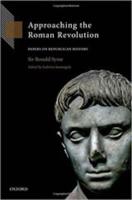
OUP (2016) h/b £90.00 428pp (ISBN 97801987670601)
This is a most unusual book, consisting as it does of 26 unpublished papers by S. on Roman history before the period covered by The Roman Revolution (1939): they date from ‘not later than the first half of the 1960s’, some of them being much earlier; but not the least unusual aspect is that, by including a long (43 pages) ‘Bibliographical Addenda’, with the aim of placing each paper within the wider framework of S.’s published work, and charting later scholarly developments, the editor has effectively included comments by other specialist scholars on the subject matter, thus largely rendering otiose any effort on the part of the present reviewer to do the same. These are important addenda, and by no means do all the comments find themselves in agreement with S.’s conclusions.
Some general points need to be made. S. makes considerable use of the pioneering prosopographical work of F. Münzer in his Römische Adelsparteien und Adelsfamilien (1920), of which there is now an English translation by T. Ridley (1999)—it is available at about £200—and rather less use of the important work (1912) of M. Gelzer (Die Nobilität der römischen Republik). A scholar who comes under withering fire more than once is Jerome Carcopino; references to Hugh Last, by contrast, are almost uniformly favourable, which may occasion some surprise, whereas even Mommsen does not escape criticism.
The articles are fully and most usefully footnoted, and quotations in Latin and Greek of any length are translated. The Introduction gives the background of the volume; it tells how S.’s unpublished papers were collected, and what they consist of; it describes other papers from the Syme archive; and concludes with a note on editorial practice which claims that typos have been tacitly corrected (a claim which the present reviewer questions: unless—most implausibly—apparent errors by S., e.g. misquotations in Virgil and Ovid, have been allowed to stand). Full bibliographical details have been supplied for all the modern works quoted by S. Some of the articles are very short and/or so densely prosopographical as to defy summary, and others are of much less than general interest; the longest by far is 26 ‘Rome and Umbria’, nearly 70 pages of ‘what appears to be a substantial monograph’.
One may single out some articles as likely to prove of wide interest. In chapter 4 ‘The Abdication of Sulla’, S. concludes that ‘By his tenure of the consulate in 80 BCE, the dictator inaugurated the rule of law and prepared the way to glide out gracefully. His retirement was not unexpected … Sulla was (a) Roman nobilis, but also… a kind of Hellenistic dynast’. In chapter 5 ‘The Speech for Roscius of Ameria’, S. suggests that, ‘if more were known about secret and personal politics in the entourage of (Sulla)’, we would understand why he was prepared to discard Chrysogonus: the parallel of Augustus and Gallus is adduced, and ‘Cicero‘s skill deserves every commendation’.
In chapter 20, ‘Caesar as Pontifex Maximus’, S. argues that Caesar did not modify the nature of the office, nor—as Carcopino had claimed—did he ‘charge it with dynamism or use it as a spiritual lever to revolutionise the Roman state’. Says S. in his familiar way, ‘the college of pontiffs got on quite well without him (while he was in Gaul), and the dynamism of the pontifex maximus was available to inspire the legions—if they cared for such things’. Carcopino’s spiritual lever (etc.) are ‘specious phrases, masking error and confusion’.
In chapter 23, ‘Virgil’s First Patron’, Servius comes in for severe criticism for ‘idle fancies, childish confusions—and sheer fiction’. S. does much to clear up misconceptions and difficulties before he concludes ‘The praises of Octavianus in the first Eclogue proclaim and consecrate Virgil’s new allegiance (39 or 38 BCE).’ However, says S., Virgil’s first patron was C. Asinius Pollio, as is decisively shown by the dedication inserted (at what stage? Who knows?) into the eighth Eclogue.
Finally, in chapter 24, ‘Caesar and Augustus in Virgil’, S. sets out to show, via extended quotation, by what delicate means Virgil downplayed Julius Caesar in the Aeneid in favour of Augustus. (En route, S. makes the interesting point that Ovid alone of the poets of the age provided a catalogue of the exploits of Julius Caesar as a conqueror in war.). S. closes by citing Ovid, Fasti 2. 141-2, in which Ovid addresses Romulus:
vis tibi grata fuit, florent sub Caesare leges
tu domini nomen, principis ille tenet.
(Regrettably, the lines as published contain a grievous misprint).
The editor rightly comments that S. was a very private man (a full biography is awaited), and it can only be conjectured why these pieces were not published before S. died in 1989 at the age of 86. The publication of H. H. Scullard’s Roman Politics 220-150 BC in 1951 may occasionally have been a factor. We should be grateful for the editor’s labours in bringing these articles of a great scholar into the light of day.
Colin Leach
